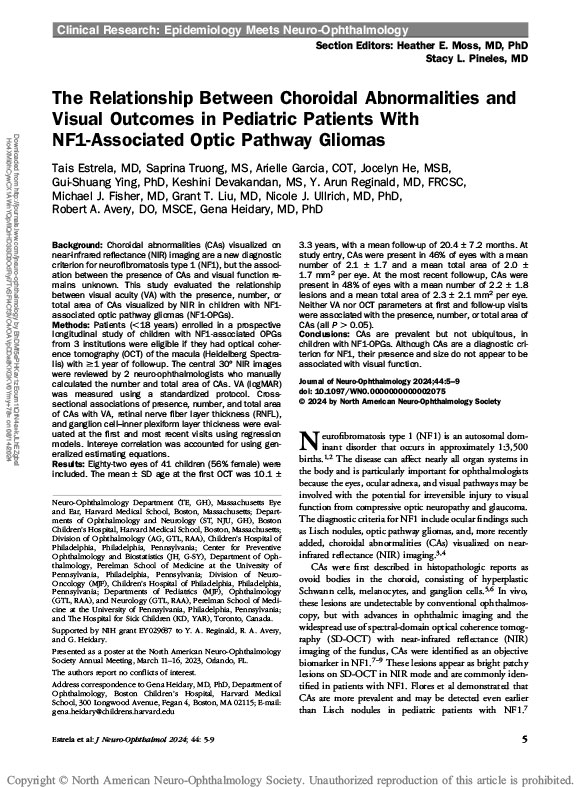The Relationship Between Choroidal Abnormalities and Visual Outcomes in Pediatric Patients With NF1-Associated Optic Pathway Gliomas
March 2024
Abstract
Background:
Choroidal abnormalities (CAs) visualized on near-infrared reflectance (NIR) imaging are a new diagnostic criterion for neurofibromatosis type 1 (NF1), but the association between the presence of CAs and visual function remains unknown. This study evaluated the relationship between visual acuity (VA) with the presence, number, or total area of CAs visualized by NIR in children with NF1-associated optic pathway gliomas (NF1-OPGs).
Methods:
Patients (<18 years) enrolled in a prospective longitudinal study of children with NF1-associated OPGs from 3 institutions were eligible if they had optical coherence tomography (OCT) of the macula (Heidelberg Spectralis) with ≥1 year of follow-up. The central 30° NIR images were reviewed by 2 neuro-ophthalmologists who manually calculated the number and total area of CAs. VA (logMAR) was measured using a standardized protocol. Cross-sectional associations of presence, number, and total area of CAs with VA, retinal nerve fiber layer thickness (RNFL), and ganglion cell–inner plexiform layer thickness were evaluated at the first and most recent visits using regression models. Intereye correlation was accounted for using generalized estimating equations.
Results:
Eighty-two eyes of 41 children (56% female) were included. The mean ± SD age at the first OCT was 10.1 ± 3.3 years, with a mean follow-up of 20.4 ± 7.2 months. At study entry, CAs were present in 46% of eyes with a mean number of 2.1 ± 1.7 and a mean total area of 2.0 ± 1.7 mm2 per eye. At the most recent follow-up, CAs were present in 48% of eyes with a mean number of 2.2 ± 1.8 lesions and a mean total area of 2.3 ± 2.1 mm2 per eye. Neither VA nor OCT parameters at first and follow-up visits were associated with the presence, number, or total area of CAs (all P > 0.05).
Conclusions:
CAs are prevalent but not ubiquitous, in children with NF1-OPGs. Although CAs are a diagnostic criterion for NF1, their presence and size do not appear to be associated with visual function.

